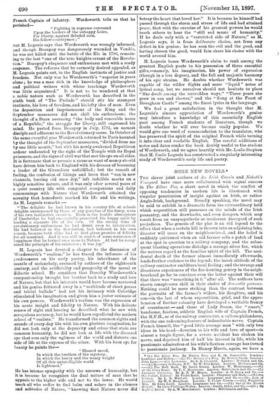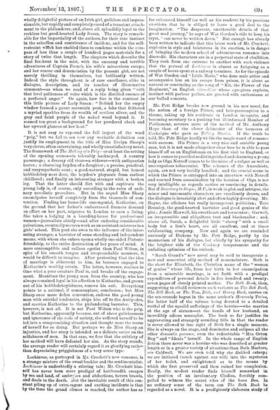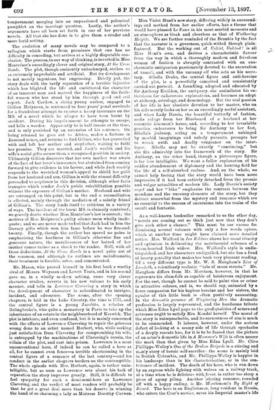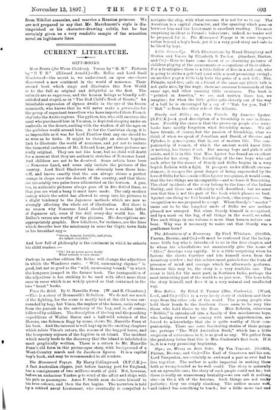SOME NEW NOVELS.*
THE clever joint authors of An Irish Cousin and gaboth's Vineyard have once more collaborated with signal success in The Silver Fox, a short novel in which the conflict of opposing tendencies in modern life is illustrated with singular penetration of insight against an Irish, or rather Anglo-Irish, background. Broadly speaking, the novel may be said to exhibit in a dramatic form the extraordinary hold which superstition still possesses on the minds of the Irish peasantry, and the drawbacks, and even dangers, which may result from an unsympathetic or intolerant disregard of such prejudices. The genesis of the plot is an old legend to the effect that when a certain hill is thrown into an adjoining lake, disaster will come on the neighbourhood, and the belief is suddenly quickened when an old farmer sells a patch of land at the spot in question to a railway company, and the subse- quent blasting operations dislodge a strange silver fox, which the natives regard as the familiar spirit of the hill. The acci- dental death of the farmer almost immediately afterwards, lends further credence to the legend; the harsh attitude of the railway contractor embitters local feeling ; and the strange and disastrous experiences of the fox-hunting gentry in the neigh- bourhood go far to convince even the latter against their will that there was "something in it "after all. The authors have shown conspicuous skill in their choice of dramatis personw. Nothing could be more striking than the contrast between the portraits of the farmer's widow, his daughter, and his son—in the last of whom superstition, grief, and the appre- hension of further calamity have developed a veritable frenzy of resentment — and those of Lady Susan, the "smart," handsome, fearless, athletic English wife of Captain French, the M.P.H., or of the railway contractor, a callous philanderer, with the one redeeming feature of indomitable nerve. Captain French himself, the "good little average man" with only two ideas in his head—devotion to his wife and love of sport—is almost a tragic figure, for a severe accident has shaken his nerve, and deprived him of half his interest in life, while his passionate admiration of his wife's flawless courage has turned to passionate jealousy. In Blaney Morris, again, we have a • (1.) The Silver Fox. By Martin Ross and E. CE. Somerville. London: Lawrence and Bullen.—(24 The Making of a Prig. By Evelyn Sharp. London: John Lane.—(3.1 Lochinvar. By S. R. Crockett. London : Mvthuen and Co. —(4.) Secretary to Bayne, M.P. By W. Pett Ridge. London: Methuen and Co. —(5.) The Beth Book. By Sarah Grand. London : W. Heinemann.—(6.) At the Cross Roads. By F. F. Montresor. Landon: Hutchinson and Co.—(7.) Lawrence Clavering. By A. E. W. Mason. London : A. D. lone, and Co.— Unkist, Unkind ! By Violet Hunt. London : Chapman and Hall.—(9.) Iva Kildare. By L. B. Walford. London: Longmans and Co.—(10.) Liza of Lambeth. By W. S. Maugham. London : T. Fisher Unwin.—(1L) Wayfaring Men. By Edna Lyall. London: Longmans and Co.—(12.) One of the Broken Brigade. By Clive Phillipps.Wolley. London: Smith, Elder, and Co.—(13 1 By Bight of Sword. By A. W. Marchmont. London : Hutchinson and Co. wholly delightfUl picture of an Irish girl, guileless and impres- sionable, but rapidly and completely cared of a transient attach- ment to the philanderer, and, above all, splendidly loyal to the reckless but good-hearted Lady Susan. The story is remark- able for the impartiality of the authors, for their true instinct in the selection and contrivance of incident, and for the self- restraint which has enabled them to condense within the corn- pass of less than a couple of hundred pages materials for a story of twice that length. The chapters which describe the final fox-hunt in the mist, with the uncanny and terrible adventures of Captain French, his wife's miraculous escape, and her rescue and denunciation by the peasant girl, are not merely thrilling in themselves, but brilliantly written. Indeed the style throughout is of rare excellence, alike in dialogue, description, and its touches of illuminative comment--as when we read of a reply being given "with that level politeness of voice which is the distilled essence of a perfected anger." Or again, how fine is the contrast in this little picture of Lady Susan : "Behind her the empty window framed a gaunt mountain peak, a lake that frittered a myriad sparkles from its wealth of restless silver, and the grey and faint purple of the naked wood beyond it. It seemed too great a background for her powdered cheek and her upward glances at her host."
It is not easy to expound the full import of the word "prig," but we fail to see how any workable definition can justify its employment in the title of Miss Evelyn Sharp's very clever, often entertaining, and wholly unsatisfactory novel The framework of The Making of a Prig—or at least the setting of the opening scenes—is tolerably hackneyed. A country parsonage ; a dreamy old vicar—a widower—with antiquarian tastes ; a charming hoyden of a daughter ; a precise, practical, and unsympathetic aunt ; a good-natured, stupid, but honest hobbledehoy next door, the hoyden's playmate from earliest childhood ; and finally an interesting stranger with a broken leg. That the latter should flirt with and captivate the young lady is, of course, only according to the rules of ordi- nary novelistic procedure. But in the sequel Miss Sharp emancipates herself completely from the trammels of con- vention. Finding her home-life uncongenial, Katharine, on the ground that her father's embarrassed finances demand an effort on her part, migrates to London to earn a living. She takes a lodging in a boarding-house for professional women—journalists chiefly—and after enduring considerable privations, eventually secures work as an assistant-mistress in a girls' school. This post she owes to the influence of the inter- esting stranger, a barrister of some standing and independent means, with whom she enters upon a wholly one-sided Platonic friendship, to the entire destruction of her peace of mind. A more contemptible and callous egotist than Paul Wilton, in spite of his smooth tongue and irreproachable manners, it would be difficult to imagine. After protesting that the idea of marriage is abhorrent to him, he becomes engaged to Katbarine's wealthy cousin. The latter, however, realises in time what a poor creature Paul is, and breaks off the engage- ment. Meantime the young man from the country, who has always remained loyal in his affection to Katharine, and grown out of his hobbledehoyishness, renews his suit. Everything points to a rational, if commonplace, conclusion ; but Miss Sharp once more defies convention, endows the good young man with suicidal tendencies, ships him off to the Antipodes, and marries Katharine to the philandering barrister. This, however, is not all. It is not Paul Wilton who is the prig, but Katharine, apparently because, out- of sheer guilelessness and ignorance of the code of society, she suffered herself to be led into a compromising situation and thought none the worse of herself for so doing. But perhaps we do Miss Sharp an injustice, and her story is intended as a delicate satire on the selfishness of men. In that case, we fear that the subtlety of her method will have defeated her aim. As the story stands, the average reader will certainly regard it as glorifying rathet- than depreciating priggishness of a very acute type.
Lochinvar, as portrayed in gr. Crockett's new romance, is a strange mixture of the swastbuckler and the sentimentalist. .Lochinvar is undoubtedly a stirring tale; Mr. Crockett him- self has never been more prodigal of hairbreadth escapes by sea and land, of ambezlies and abductions, tavern brawls, and duels to the death. `;dut the inevitable result of this con- stant piling up of extra ragout and exciting incidents is that by the time the grand climax is reached, the author has so far exhausted himself (as well as his readers) by his previous exertions that be is obliged to leave a good deal to the imagination. "The desperate, unutterable details of that great mad journey," he says of Wat Gordon's ride to keep his tryst, can never be written down." Bat enough has already been written to indicate that this latest work of Mr. Crockett, explosive in style and boisterous in its emotion, is in danger of bringing the modern school of adventurous romance into discredit. His characters are in a perpetual state of ebullition. They rush from one extreme to another with such violence that the perusal of Lochinrar is almost as fatiguing as a couple of hours spent at a railway terminus. As for the episode of Wat Gordon and "Little Marie," who dons male attire and accompanies him on his escape from prison, it is about as natural or convincing as the song of "Kit, the Flower of the Regiment," an English vivaniliZre whose egregious exploits, instinct with parlour pathos, are greeted with enthusiasm at our ballad concerts.
Mr. Pett Ridge breaks new ground in his new novel, for the notion of a foreign Prince, and heir-presumptive to a throne, taking up his residence in London incognito, and becoming secretary to a pushing but ill-informed Member of Parliament, savours more of the method of Mr. Anthony Hope than of the clever delineator of the humours of Cockaigne who gave us Telling Storks. lf the truth be told, Mr. Pett Ridge hardly wilds the magic wand of romance with success. His Prince is a very nice and amiable young man, but it is not made altogether clear bow he is able to pass himself off as an Englishman on his first visit to England, or how it comes to pass that so distinguished and charming a young lady as Olga Netroff comes to be the niece of a vulgar as well as unscrupulous tobacconist. The schemes of the Anarchists, again, are not very lucidly handled ; and the crucial scene in which the Prince is entrapped into an interview with Netroff and rescued from assassination by the heroism of Olga is not very intelligible as regards motive or convincing in details. But if Secretary to Bayne, M.P., is weak in plot and intrigue, the minor and unromantic characters are excellently drawn, and the dialogue is invariably alert and often highly diverting. Mr. Bayne, the officious but really incompetent politician ; Tate Bromley, the good-hearted barrister and good genius of the plot ; Jennie Maxwell, his sweetheart and tormenter; Garwell, an irrepressible and ubiquitous tout and blackmailer ; and, above all, Sarah, a delightful little " slavey " with a small body but a lion's heart, are all excellent, and at times exhilarating, company. Now and again we are reminded curiously of Dickens by Mr. Pett Ridge, partly by the mannerism of his dialogue, but chiefly by his sympathy for the brighter side of the Cockney temperament and the unfailing optimism of his outlook.
"Sarah Grand's" new novel may be said to inaugurate a new and somewhat silly method of nomenclature. Beth is the short for Elizabeth, the Christian name of the "woman of genius" whose life, from her birth to her emancipation from a miserable marriage, is set forth with a prodigal expenditure of personal details in five hundred and twenty- seven pages of closely printed matter. The Beth Book, then, suggesting to ribald reviewers such variants as The Bob Book, The Bill Book, or The Tom, Dick, and Harry Book, carries on the sex-crusade begun in the same author's Heavenly Twins, the latter half of the volume being devoted to a detailed recital of the squalid sufferings of the heroine—who marries at the age of sixteen—at the hands of her husband, an incredibly odious sensualist. The book so far justifies its aggravating and strangely sounding title in that the reader is never allowed to lose eight of Beth for a single moment. She is always on the stage, and dominates and eclipses all the other dramatis persona., even the redoubtable "Mrs. Orton Beg" and " Ideala" herself. In the whole range of English fiction there never was a heroine who was described at greater length or in a greater variety of situations than Beth Maclure, nee Caldwell. We are even told why she disliked catsup; we are initiated (much against our will) into the mysteries of her toilet, and enlightened as to the means by which she first preserved and then ruined her complexion. Really, the modest reader finds himself somewhat in the position of an involuntary Clodiue, forcibly com- pelled to witness the secret rites of the bona Dea. In no ordinary sense of the term can The Beth Book be regarded as a novel. It is a prodigiously elaborate study of
temperament merging into an impassioned and polemical pamphlet on the marriage question. Lastly, the author's arguments have all been set forth in one of her previous novels. All that she has done is to give them a cruder and more lurid setting.
The evolution of many novels may be compared to a syllogism which starts from premisses that one has no difficulty in conceding, but arrives at a highly disputable con- clusion. The process, to our way of thinking, is inverted in Miss Montresor's exceedingly clever and original story, At the Cross Roads. The plot, though eminently unhackneyed, strikes us as extremely improbable and artificial. But its development is not merely ingenious, but engrossing. Briefly put, the story deals with the tardy reparation of a terrible injustice which has blighted the life and embittered the character of an innocent man and marred the happiness of the faith- ful woman who has stood by him through good and evil report. Jack Cardew, a rising young author, engaged to Gillian Molyneux, is sentenced to four years' penal servitude for a fraudulent attempt to recover a heavy insurance on the MS. of a novel which he alleges to have been burnt by accident. During his imprisonment he attempts to escape, and kills a warder. Appartutly he is half insane at the time, and is only punished by an extension of his sentence. On being released he goes out to Africa, makes a fortune in 3iamond mines, and returns to find Gillian, who has quarrelled with and left her mother and stepfather, waiting to fulfil her promise. They are married, and Jack's wealth and his wife's social gifts secure them a recognised position in society. Ultimately Gillian discovers that her own mother was aware of the fact of her lover's innocence, but abstained from coming forward to give evidence in his favour, and while Jack readily responds to the wretched woman's appeal to shield her guilt from her husband and son, Gillian is with the utmost difficulty persuaded to acquiesce in this decision, although other facts transpire which render Jack's public rehabilitation possible without the exposure of Gillian's mother. Husband and wife are estranged on this point, but in the end a reconciliation is effected, mainly through the mediation of a saintly friend of Gillian's. The story lends itself to criticism in a variety of ways. The incident of the burnt MS. is clumsily contrived; we gravely doubt whether Miss Montresor's law is correct; the motives of Mrs. Molyneux's guilty silence seem wholly inade- quate; and we are never made to feel that Jack had in him the literary gifts which won him fame before he was five-and- twenty. Finally, though the author has spared no pains in emphasising the hardness in Gillian's otherwise fine and generous nature, the mercilessness of her hatred of her mother comes rather as a shock to the reader. Still, with all these deductions, Al the Cross Roads is a novel quite out of the common, and although its outlines are melodramatic, their treatment is forcible, sober, and concentrated.
Mr. Mason, who proved himself in his first book a worthy rival of Messrs. Weyman and Levett Yeats, and in his second gave us, in a wholly modern setting, some very clever character studies, reverts in his new volume to his early manner, and tells in Lawrence Clavering a story in which the development of character is subordinated to intrigue, incident, and adventure. The scene, after the opening chapters, is laid in the Lake Country, the time is 1715, and the central figure is a young Jacobite, a relative of Bolingbroke's, who quits a monastery in Paris to take up the inheritance of an estate in the neighbourhood of Keswick. The plot is intricate, and even confused, but it is mainly concerned with the efforts of Lawrence Clavering to repair the grievous wrong done to an artist named Herbert, who, while seeking just satisfaction from Clavering for compromising his wife, is entrapped by the machinations of Clavering's cousin, the villain of the plot, and cast into prison. Lawrence is a most unconventional hero, if indeed he can be called a hero at all, for he cannot even fence—a terrible shortcoming in the central figure of a romance of the last century—and his conduct in the earlier chapters borders on the contemptible. The whole episode with Mrs. Herbert, again, is rather unin- telligible, but as soon as Lawrence sets about his task of reparation the story improves greatly. Still, it is difficult to feel sympathy for such a demi-semi-hero as Lawrence Clavering, and the verdict of most readers will probably be that he got a great deal more than his deserts in winning the hand of so charming a lady as Mistress Dorothy Curwen.
Miss Violet Hanes new story, differing widely in surround- ings and method from her earlier efforts, has a theme that would have pleased Le Fanu in his most morbid moments and an atmosphere as bleak and cheerless as that of Wuthering Heights. We are further reminded of the Brontes by the fact that the narrator is a governess, quick-witted though plain- featured. But the working out of Unkist, Unkind ! is all Miss Hunt's own, and derives a characteristic flavour from the way in which a thoroughly modern and frivolous woman of fashion is abruptly contrasted with an ana- chronistic antiquarian passionately devoted to the excavation of tumuli, and with the uncanny elf who acts as his secre- tary. Sibella Drake, the central figure and anti-heroine of the plot, is a powerfully conceived and consistently carried out portrait. A foundling, adopted and educated by Sir Anthony Ercildon, the antiquary, she assimilates his en- thusiasm for cadaverous explorations, and becomes an adept at alchemy, astrology, and demonology. But the real passion of her life is her absolute devotion to her master, who on his side merely looks on her as an exceedingly useful assistant, and when Lady Darcie, the beautiful butterfly of fashion, seeks refuge from her Bluebeard of a husband at her eccentric kinsman's house, and, according to her invariable practice, endeavours to bring Sir Anthony to her feet, Sibella's jealousy, acting on a temperament unhinged by morbid imaginings and unholy pursuits, prompts her to wreak swift and deadly vengeance on the inter- loper. Sibella may not be exactly "convincing," but she fits admirably into the framework of the story. Sir Anthony, on the other hand, though a picturesque figure, is far less intelligible. We want a fuller explanation of his sudden abandonment of diplomacy and the hunting field for the life of a self-absorbed recluse. And, on the whole, we cannot help feeling that the story would have been more impressive if it had been entirely detached from the prosaic and vulgar actualities of modern life. Lady Darcie's society argot and her " bike " emphasise the contrast between the mundane and the uncanny elements of the story, but they detract somewhat from the mystery and romance which are so essential to the success of excursions into the realm of the occult and fantastic.
As a well-known bookseller remarked to us the other day, "novels are coming out so thick just now that they don't give each other a chance." This must be our excuse foi dismissing several volumes with only a few words apiece, which at another time might have claimed more detailed notice. Mrs. Walford in Iva Kildare shows her usual vivacity and optimism in delineating the matrimonial schemes of a warm-hearted Irish widow. Mrs. Walford's style is undis- tinguished, and her characters undignified, but she has a fund of hearty geniality that makes her book very pleasant reading. Of a very different type is Mr. W. S. Ilaugham's Liza of Lambeth, a relentlessly realistic "tale of mean streets." Mr. Maugham differs from Mr. Morrison, however, in that he represents his slum-folk as capable of boisterous enjoyment. For the rest, though he cannot be said to paint vice or crime in attractive colours, and is, we should say, animated by a fierce compassion for his hapless heroine and her sisters, the squalor of this little book is often positively nauseating. In the dramatis personw ,of Wayfaring Men the dramatic profession is largely represented, and the handsome tribute which Miss Edna Lyall pays to the good qualities of actors and actresses ought to satisfy Mrs. Kendal herself. The moral of the story is unimpeachable, and its earnestness of aim is much to be commended. It labours, however; under the serious defect of looking at a seamy side of life through spectacles of a deeply roseate hue, for it is to be feared that the picture of an actor's domestic life in A Mummer's Wife is often nearer the mark than that given by Miss Edna Lyall. Mr. Clive .Phillipps-Wolley's One of the Broken Brigade is a stirring and manly story of heroic self-sacrifice : the scene is mainly laid in British Columbia, and Mr. Phillipps-Wolley is happier in his landscape than in his eharacterisation, or in the con- trivance of incident. The death of his hero, who is run down by an express while fighting with wolves on a railway track, at a time when he is delirious with fever, is rather too steep a piece of agony piling. Another 'atirring romance, rounded off with a happy ending, is Mr. llsrchmunt's By Right of sword. The hero is an Englishman, long resident in Russia, who enters the Czar's service, saves his Imperial master's life
from Nihilist assassins, and marries a Russian princess. We are not prepared to say that Mr. Marchmont's style is dis- tinguished or his character-drawing subtle, but he has certainly given us a very readable sample of the sensation novel on legitimate lines.









































 Previous page
Previous page